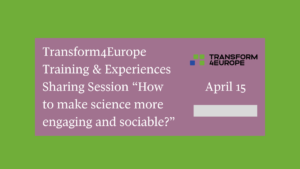TRANSFORM4EUROPE TRAINING & EXPERIENCES SHARING SESSION
“HOW TO MAKE SCIENCE MORE ENGAGING AND SOCIABLE?”
We invite academic staff, researchers and PhD students of Transform4Europe universities to participate in the Training & Experiences Sharing Session “How to make science more engaging and sociable?”. The online training will be held on April 15, 9.00–15.45 CET (MS TEAMS).
The session consists of two parts. The first part is dedicated to citizen science and will focus on the presentation of its concept and main principles, limitations and problems that could be encountered during citizen sciences projects. The trainers also will share their exemplary experiences in implementing citizen science projects or related activities in different countries and universities.
The second part is dedicated to improving science communication competencies. The program comprises theoretical and practical approaches, covering topics such as the complexity of science communication, ethics in the field, navigating visual misinformation, and utilizing social media tools for effective communication. Led by experts from various institutions, the program aims to enhance participants’ skills in conveying scientific information and navigating the challenges of communication in today’s diverse media landscape.
The reminder about upcoming The Training & Experiences Sharing Session together with login reference will be sent to all registered participants approximately 3–5 days before the event. The Training & Experiences Sharing Session will be recorded.
The programme times are Central European Time. You can convert the times for your location here: https://greenwichmeantime.com/time/to/cet-local
SCHEDULE
PART I: CITIZEN SCIENCE
Moderated by Tomas Berkmanas, Associate Professor
Vytautas Magnus University, Lithuania
9.00–9.45 CET
Citizen Science in Practice: Ecosystem Approach
Eglė Butkevičienė, Professor
Kaunas University of Technology, Lithuania
9.45–10.15 CET
Exploring the Role of Private Natural History Collections in Citizen Science: Opportunities and Challenges
Veljo Runnel, Citizen Science Expert
University of Tartu, Estonia
10.15–10.45 CET
Transferable Experiences and Lessons Learnt from Citizen Science Project on Wildlife Conservation
Elena Buzan, Professor
University of Primorska, Slovenia
10.45–11.00 CET
Citizen Science Q & A
11.00–12.00 CET
Lunch Break
PART II: SCIENCE COMMUNICATION
Moderated by Austė Aleksandravičiūtė-Šviažienė, Science Communication Specialist, Lecturer
Vytautas Magnus University, Lithuania
12.00–12.45 CET
The Complexity of Science Communication
Austė Aleksandravičiūtė-Šviažienė, Science Communication Specialist, Lecturer
Vytautas Magnus University, Lithuania
This lecture aims to delve into the intricacies of science communication, exploring the multifaceted challenges and nuances inherent in conveying scientific concepts to diverse audiences.
12.45–13.30 CET
Ethics of Science Communication
Tomaž Grušovnik, Associate Professor
University of Primorska, Slovenia
The lecture will introduce the audience to the basics of ethical reflection and explain important virtues in science communication: truthfulness, objectivity, courage, etc.
13.30–13.45 CET
Break
13.45–14.45 CET
Navigating the Landscape of Visual Misinformation (Lecture/Seminar)
Kert Viiart, Associate Professor, Graphic Designer and Visual Artist
Estonian Academy of Arts, Estonia
As images and videos continue to be potent tools for disseminating information, the responsibility to promote accuracy and truth in visual communication becomes imperative in navigating the complex landscape of contemporary media.
14.45–15.45 CET
Social Media Tools for Science Communication (Workshop)
Karin Marinič, Digital Communications Editor & Amy Simmons, Assistant Researcher
University of Primorska, Slovenia
This workshop will discuss practical ways to create engaging and accessible science communication. Lecturers will share tips and tricks for effective & creative communication on social media.



